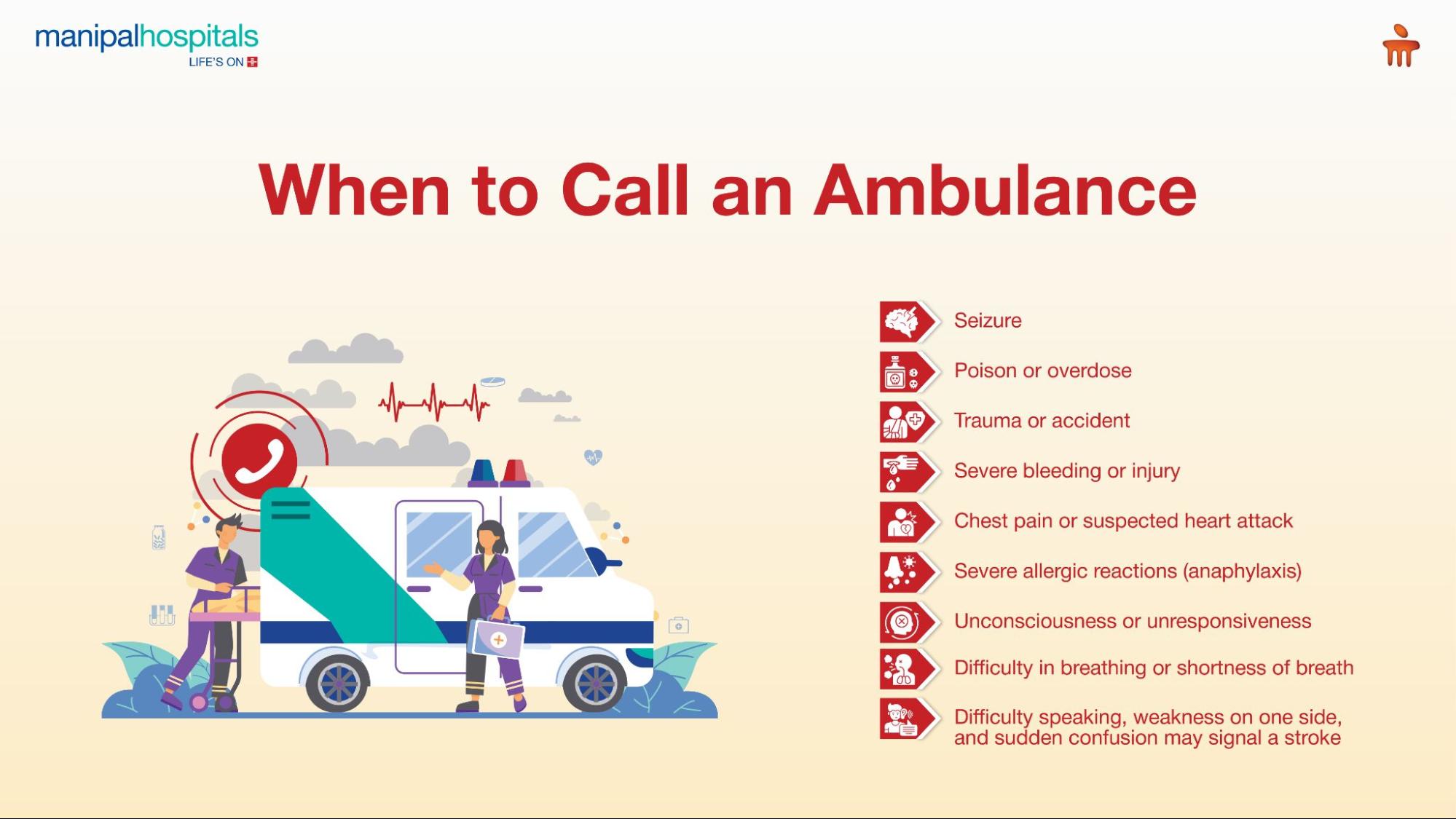A minute of hesitation can cost a life during a medical emergency.
Knowing how emergency ambulance services work—and how fast to act—can make all the difference when every second counts. Whether it’s a stroke, heart attack, severe trauma, sudden collapse, or experiencing symptoms like sudden chest pain or difficulty breathing, your immediate response can make a difference in a life-or-death situation.
Emergency ambulance services form the backbone of pre-hospital care. They offer rapid medical support, stabilisation, and safe transport to hospitals. The World Health Organisation (WHO) states that effective emergency care could prevent more than half of deaths and a significant share of disability in low- and middle-income countries. Our aim through this blog is to empower you with knowledge about how emergency services operate and how you can be prepared to face an emergency calmly and swiftly.
For timely treatment during critical situations, consult top specialist in emergency medicine in Mukundapur, Kolkata and reach out to our dedicated emergency and accident care department for comprehensive support.
Synopsis
What is the Emergency Ambulance Service?
Emergency ambulance Services are specialised medical teams that respond to life-threatening situations using fully equipped ambulances, usually through a centralised emergency helpline. These ambulances have advanced equipment, trained paramedics, emergency medical technicians, and sometimes a doctor, depending on the severity of the call.
There are different types of ambulance services, including:
-
Basic Life Support (BLS): These are equipped for non-life-threatening cases and provide essential care like basic wound management, oxygen administration, and patient monitoring.
-
Advanced Life Support (ALS): ALS ambulances are equipped with highly advanced equipment like defibrillators, ECG monitors, ventilators, and life-saving medications to manage severe emergencies like cardiac arrest, stroke, and trauma.
-
Air Ambulance: Air ambulances are specialised helicopters or planes designed to transport critically ill or injured patients long distances.
When to Call an Ambulance?

Dial the emergency helpline if you experience any of these:
-
Chest pain or suspected heart attack
-
Difficulty in breathing or shortness of breath
-
Difficulty speaking, weakness on one side, and sudden confusion may signal a stroke
-
Severe bleeding or injury
-
Unconsciousness or unresponsiveness
-
Severe allergic reactions (anaphylaxis)
-
Seizure
-
Poison or overdose
-
Trauma or accident
Emergency ambulance services will reach you quickly to provide life-saving support.
What Happens After You Call an Ambulance?
Initial Dispatch
When you dial an emergency number, your call is directed to a trained dispatcher. The dispatcher will ask about the type of emergency, exact location, patient’s condition, and contact information. Based on the information, they will immediately dispatch an ambulance from the nearest location and provide you with some life-saving instructions over the phone, such as how to give CPR or manage bleeding until the medical professionals arrive.
On-site Emergency Care
Upon arrival, the medical team will quickly assess the patient's condition and provide immediate interventions such as administering oxygen, performing CPR or defibrillation, stopping bleeding, stabilising fractures, or other urgent treatments. The team will continuously monitor vitals and safely transport the patient to the hospital.
Hospital Transfer
Paramedics hand over the patient’s details safely and accurately to hospital staff. At Manipal Hospitals, we are well-equipped to manage medical emergencies with 24/7 emergency ambulance services, trauma centres, and advanced critical care units.
How to Act in an Emergency Crisis?
Do’s
-
Call the emergency helpline immediately
-
Stay calm and speak clearly. Give the dispatcher accurate details and your exact location
-
Stay close to the patient and reassure them until help arrives
-
Clear space for the ambulance — open gates, move vehicles, or remove obstacles
-
Follow any life-saving instructions given by paramedics
-
Inform the patient’s family or a close relative
Dont’s
-
Do not create panic around the patient
-
Don't delay the call, hoping that symptoms will pass
-
Don’t move the patient unless it's necessary or there is any danger
-
Do not provide food or drinks to the patient
-
Do not leave the patient alone
Save emergency numbers on speed dial and educate family members, especially children, about when and how to call for help.
Watch how Manipal Hospitals handle real-time emergencies here: Manipal Hospitals -Emergency Care
Conclusion
In a medical emergency, every moment counts. Recognising warning signs, acting quickly, and calling emergency ambulance services can dramatically improve survival. With 24/7 ambulance services, advanced life-saving equipment, experienced paramedics, and critical care units, Manipal Hospitals, Mukundapur, is ready when you need us most. Know the signs, make the call, and let the experts handle the rest. Call Manipal Hospitals Emergency Services now or dial 108.
For immediate assistance, contact Manipal Hospitals Emergency Services at 033 2222 1111.
FAQ's
You can call 033 2222 1111 to access Manipal Hospitals’ emergency ambulance service. This is a 24/7, toll-free service available in most states, designed to respond quickly to critical medical situations.
Be ready to share: The exact location (with landmarks if possible), the nature of the emergency, the patient’s condition, and your contact details.
Yes, in most cases, one family member or caregiver is allowed to travel with the patient, provided space and safety protocols allow.
Response time depends on your location, traffic, and ambulance availability. In urban areas, it may arrive within 10–20 minutes, while in rural areas it may take longer. Manipal Hospitals offers 24/7 ambulance service to ensure help is available anytime, day or night.
Dispatch systems prioritise calls based on urgency. Life-threatening cases are always given top priority. Emergency ambulance services typically have a network of vehicles and can coordinate with nearby hospitals or services to ensure a timely response.





















 5 Min Read
5 Min Read














